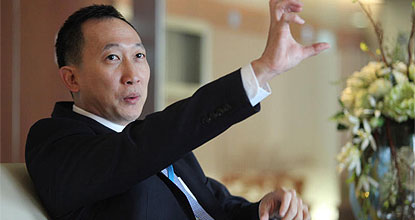
Krungthai Bank (KTB) will focus on small and medium-sized enterprises (SMEs) and retail loans over the next three years, targeting 10% growth as the sectors have higher margins, says president Vorapak Thanyawong.

President Vorapak Thanyawong says Krungthai Bank is using stronger risk management to control non-performing loans at small businesses. PAWAT LAOPAISARNTAKSIN
SME and retail loans represent some 50% of the bank’s total outstanding loan portfolio of 1.73 trillion baht. Another 40% are corporate loans and 10% government loans.
Mr Vorapak told the Bangkok Post that while corporate and government loan growth is likely to be flat, more attention will be lavished on fee-based income from the wholesale banking business.
The bank will focus more intensely on small operators with credit lines between 11-20 million baht and micro-sized operators with credit up to 10 million. The shift is due to their high growth potential and minimal access to financial sources.
The first phase of the bank’s infrastructure system development, the KTB transformation project, has improved its loan approval and debt collection processes to cope with strong competition and made its risks more manageable.
“With our stronger risk management basis, KTB is ready to expand our SME and retail loan portfolio,” said Mr Vorapak.
For wholesale and government loans, being selective about customers is its key to maintaining a reasonable spread for this low-yield sector.
Product cross-selling and fee-based income services are other strategies that contribute income from segmentation. For any government infrastructure megaproject investment, the bank will concentrate on the supply chain, he said.
“We prefer clients who obtain loans with credit lines as part of a financing project. We are not interested in closing deals with corporate clients that just want to borrow a single loan product,” said Mr Vorapak.
KTB, 55% owned by the Finance Ministry, reported loan growth of 5.78% for the first half this year compared with marginal growth for its peers amid the stuttering economy.
“Even though we see brighter prospects for the economy in the second half and we may book loan growth up to 10% above the industry average, we are still maintaining our target at 5-7% growth for the whole year. Our policy this year is to go with the flow rather than pushing growth too hard as the economy remains fragile,” said Mr Vorapak.
Rising non-performing loans (NPLs) in the first quarter were based on the recent hiccup in the economy, prompting the bank to set higher loan-loss provisions over the quarter at 700 million baht, up from 500 million in preparation for a fragile economy locally and domestically.
The bank’s coverage ratio is 106% with a capital adequacy ratio of 13.3%, slightly lower than the industry average at 15-16%. It expects the capital base will increase to 14.3% in the second quarter after the bank succeeded in its recent subordinated debt tier-two issuance worth of US$700 million.
Although loan-loss reserves are higher this year, its profitability is expected to improve despite a lower net profit of nearly 3% in the first quarter. In the first quarter of 2014, KTB announced a net profit of 8.30 billion baht, down 2.91% year-on-year.
Mr Vorapak said the bank’s NPLs have stabilised since the second quarter and are expected to gradually improve in the third quarter.
As foreign investors are concerned about the political situation, both the government and private sector should help to clarify the circumstances, he said.
“I agree with a democratic general election. But before an election, reform is needed to lay a political foundation and create transparency to pave the way for a solution to corruption,” said Mr Vorapak.